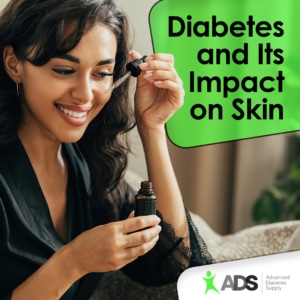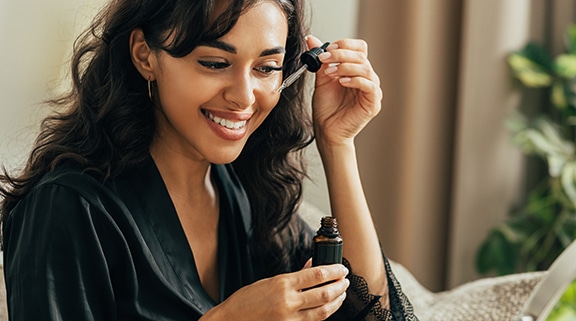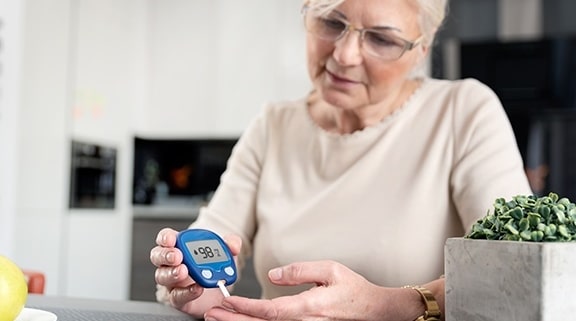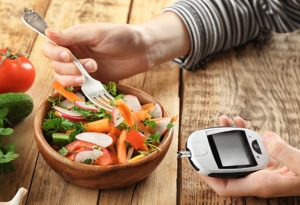Complications related to diabetes can affect all sorts of organs in the human body, including the eyes, kidneys, and heart. But did you know that this disease could also affect your biggest organ of all – that is, your skin? If you don’t take diabetes management seriously, you could fall victim to all sorts of skin-related complications.
Fortunately, there are many ways to enjoy having glowing skin, whether you have diabetes or not. One step that can help improve your skin health is eating right. Check out the ADS guide to building a diet that takes both diabetes and skincare into account, along with all the other skin health tips you need.
How Can Diabetes Affect Your Skin Health?
There’s a good chance that you’re already aware of the most infamous diabetes complications – a category that includes heart disease, blindness, nerve damage, and many other conditions. What you may not know is that skin-related diabetes complications are just as common. In fact, these complications can serve as the first warning sign of diabetes or prediabetes, so paying close attention to your skin health is vital.
Like other diabetes complications, skin problems linked to diabetes usually result from uncontrolled blood sugar levels. If you’ve already been diagnosed with diabetes but have started noticing skin problems, it may indicate that you need to make changes to your diabetes treatment regimen. Contact your physician to discuss.
Some diabetes complications related to the skin include:
- Itchy patches on the skin, usually brown, yellow, or reddish in color
- Hard, thick skin, especially on the backs of hands and fingers
- A dark band of skin that feels like velvet
Skin infections
- Open wounds or sores, particularly on the feet
- The sudden appearance of reddish-yellow bumps that look like pimples

- Unusually itchy, dry skin
- A large number of skin tags, most common areas for growth include on the eyelids, neck, armpit and groin.
The Four Best Nutrients for Healthy Skin
When you’re working to manage diabetes, it’s crucial to make sure you’re eating a nutritious diet. That also applies to skin health – and many of the foods that help fight diabetes also contribute to glowing skin! By eating foods rich in these four nutrients, you’ll reap the benefits of improved skin health and enhanced diabetes control.
Vitamins
Foods high in vitamins C, E, A, K, and B complex are just what you need to keep your skin healthy! The vitamins and antioxidants found in colorful fruits and veggies do a fantastic job of preventing dry skin, protecting against free radical damage, and making wrinkles less visible.
Vegetables like carrots, sweet potatoes, beans (including red, black, and pinto beans), peppers, artichokes, kale, tomatoes, broccoli, and spinach are chock-full of vitamins. The same is true for all sorts of fruits, including plums, grapes, berries, and kiwi. Just be sure to include these foods while counting carbs!
Essential Fatty Acids
Weight loss can be highly beneficial when you’re controlling diabetes. But while cutting down on fat is often a good idea, you shouldn’t eliminate fat from your diet – especially since some fats are healthier than others. Reasonable portions of essential fatty acids can help your skin maintain its vital oil barrier.
The best strategy is to focus on foods with unsaturated fats like Omega-3 and Omega-6 fatty acids. Omega 3 fatty acids can be found in cold-water fish (like sardines, mackerel, and salmon), walnuts, flaxseed, and olive oil. Meanwhile, you’ll get Omega 6 fatty acids from various cooking oils, poultry, nuts, seeds, and grains.
Minerals
Selenium. Studies show that selenium may help lower your risk of skin cancer, along with improving your skin’s elasticity. But this isn’t the only mineral that can boost your skin health, either. Some excellent dietary sources of selenium are the whole grains found in cereals and brown rice, eggs, seafood, and garlic.
Copper promotes elastin development. Whole grains can also help you get extra copper, and the same is true for eating nuts and seeds, avocados, green leafy vegetables, beans, and shellfish.
Zinc. Zinc is a well known mineral for healthy skin. Zinc is necessary for collagen formation and plays an important role in wound healing. Zinc is found in meat, poultry, nuts, beans, dairy foods and whole grains.
Water
You may not usually think of water as a nutrient, but it fits the definition of this category – and staying hydrated is essential to good skin health. Getting at least half a gallon (or eight to ten glasses) of water a day can help your skin look young and stay moist.
Drinking water isn’t the only way you can get this indispensable nutrient. You can also drink beverages like green or black tea, along with eating the right portion sizes of water-packed foods like peaches, celery, and (of course) watermelon.
Even More Diabetes Skin Care Tips
Putting some thought into improving your diet is a fantastic way to start working on skincare if you have diabetes. That said, it isn’t the only way to keep your skin as healthy as possible. You should also:
- Regularly check your body for sores, cuts and scratches – especially on your feet and legs.

- Exercise most days of the week to help control your diabetes.
- Talk to your healthcare team or doctor about the links between diabetes and skin problems.
- Cover your skin when going outside to lower your risk of injury.
- Use sunscreen while out, even on cloudy days.
- Moisturize your skin when it’s dry, and take short showers that aren’t too hot or cold.
- Use a humidifier during the winter if you live in a cold climate.
- Create a “first aid kit” for your skin with gauze pads, antibacterial ointment, hypoallergenic tape, and cleansing wipes.
Avoid anxiety by ordering the diabetes supplies you need from ADS! We’re the nation’s most trusted supplier of insulin, diabetes testing supplies, glucose meters, and more.
For a consultation on how to keep your skin healthy while living with diabetes please contact our Certified Diabetes Educator for more details.





























